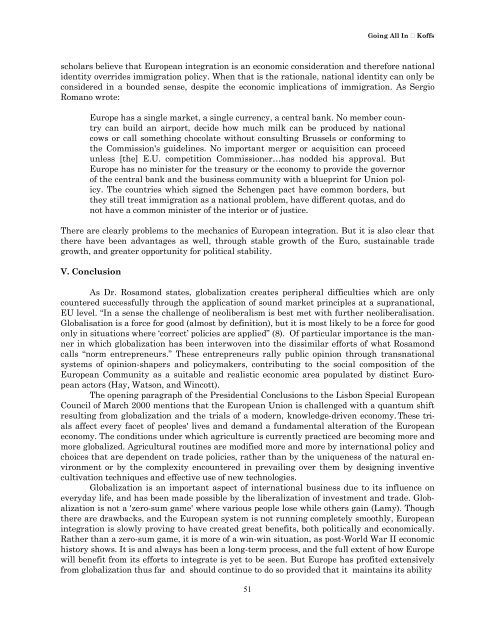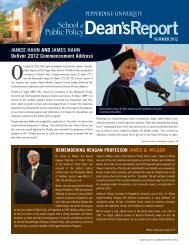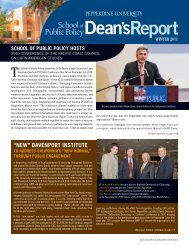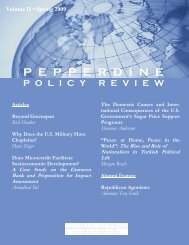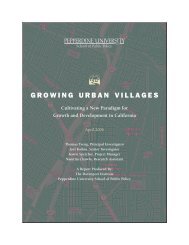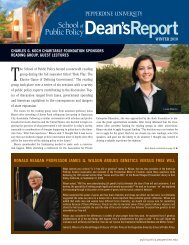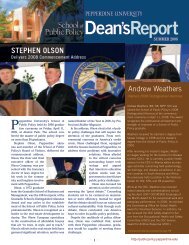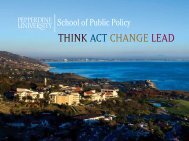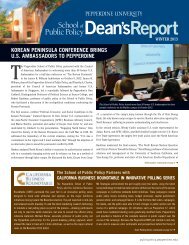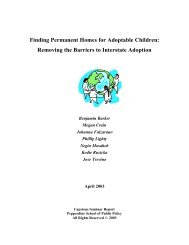Pepperdine University School of Public Policy
Pepperdine University School of Public Policy
Pepperdine University School of Public Policy
You also want an ePaper? Increase the reach of your titles
YUMPU automatically turns print PDFs into web optimized ePapers that Google loves.
Going All In K<strong>of</strong>fs<br />
scholars believe that European integration is an economic consideration and therefore national<br />
identity overrides immigration policy. When that is the rationale, national identity can only be<br />
considered in a bounded sense, despite the economic implications <strong>of</strong> immigration. As Sergio<br />
Romano wrote:<br />
Europe has a single market, a single currency, a central bank. No member country<br />
can build an airport, decide how much milk can be produced by national<br />
cows or call something chocolate without consulting Brussels or conforming to<br />
the Commission's guidelines. No important merger or acquisition can proceed<br />
unless [the] E.U. competition Commissioner…has nodded his approval. But<br />
Europe has no minister for the treasury or the economy to provide the governor<br />
<strong>of</strong> the central bank and the business community with a blueprint for Union policy.<br />
The countries which signed the Schengen pact have common borders, but<br />
they still treat immigration as a national problem, have different quotas, and do<br />
not have a common minister <strong>of</strong> the interior or <strong>of</strong> justice.<br />
There are clearly problems to the mechanics <strong>of</strong> European integration. But it is also clear that<br />
there have been advantages as well, through stable growth <strong>of</strong> the Euro, sustainable trade<br />
growth, and greater opportunity for political stability.<br />
V. Conclusion<br />
As Dr. Rosamond states, globalization creates peripheral difficulties which are only<br />
countered successfully through the application <strong>of</strong> sound market principles at a supranational,<br />
EU level. “In a sense the challenge <strong>of</strong> neoliberalism is best met with further neoliberalisation.<br />
Globalisation is a force for good (almost by definition), but it is most likely to be a force for good<br />
only in situations where ‘correct’ policies are applied” (8). Of particular importance is the manner<br />
in which globalization has been interwoven into the dissimilar efforts <strong>of</strong> what Rosamond<br />
calls “norm entrepreneurs.” These entrepreneurs rally public opinion through transnational<br />
systems <strong>of</strong> opinion-shapers and policymakers, contributing to the social composition <strong>of</strong> the<br />
European Community as a suitable and realistic economic area populated by distinct European<br />
actors (Hay, Watson, and Wincott).<br />
The opening paragraph <strong>of</strong> the Presidential Conclusions to the Lisbon Special European<br />
Council <strong>of</strong> March 2000 mentions that the European Union is challenged with a quantum shift<br />
resulting from globalization and the trials <strong>of</strong> a modern, knowledge-driven economy. These trials<br />
affect every facet <strong>of</strong> peoples' lives and demand a fundamental alteration <strong>of</strong> the European<br />
economy. The conditions under which agriculture is currently practiced are becoming more and<br />
more globalized. Agricultural routines are modified more and more by international policy and<br />
choices that are dependent on trade policies, rather than by the uniqueness <strong>of</strong> the natural environment<br />
or by the complexity encountered in prevailing over them by designing inventive<br />
cultivation techniques and effective use <strong>of</strong> new technologies.<br />
Globalization is an important aspect <strong>of</strong> international business due to its influence on<br />
everyday life, and has been made possible by the liberalization <strong>of</strong> investment and trade. Globalization<br />
is not a 'zero-sum game' where various people lose while others gain (Lamy). Though<br />
there are drawbacks, and the European system is not running completely smoothly, European<br />
integration is slowly proving to have created great benefits, both politically and economically.<br />
Rather than a zero-sum game, it is more <strong>of</strong> a win-win situation, as post-World War II economic<br />
history shows. It is and always has been a long-term process, and the full extent <strong>of</strong> how Europe<br />
will benefit from its efforts to integrate is yet to be seen. But Europe has pr<strong>of</strong>ited extensively<br />
from globalization thus far and should continue to do so provided that it maintains its ability<br />
51


